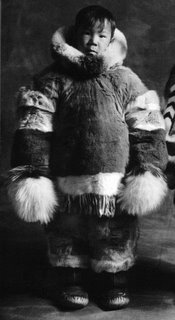 The picture is staring at me.
The picture is staring at me.But I know it isn’t. The subject who once (whenever) posed for that picture (wherever) is now somewhere living his life, unaware of my scrutiny/me.
I find that a photograph inescapably entails a dislocation of time and place. Somehow the continuum is shattered by representation, for it does feel like the subject will be looking forever into the lens, straight at me, when in fact I am the one looking. Such a reversal. And does not feeling something make that “something” real? I know that's a bit far-fetched, and the meditation could go on forever.
The truth behind it all is that the beholder that I am feels comforted in her loneliness by the delusional feeling of reciprocity the portrait affords. Self-deception is a mighty drug.
[The picture: Karim Rholem. Uvattinnit: le peuple du Grand Nord = The People of the Far North. Trans. Donald Smith and Brigitte Vincent-Smith. Montréal: Alain Stanké, 2001. 53.]


No comments:
Post a Comment